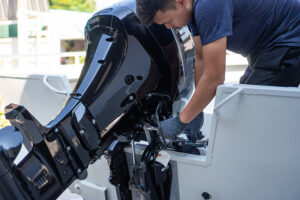As warmer weather approaches, many are focusing on water activities like boating—a pleasure and escape from daily life.
Whether you enjoy water skiing, fishing, sailing, or cruising, it’s a great way to relax outdoors with family and friends, feeling the sun, spray, and wind on your face.
Around 30,000 second-hand boats are listed monthly in Australia, attracting both first-time and seasoned buyers. Many newcomers aren’t sure what they need or how to avoid purchasing a problematic boat.
Buyers often focus on appearance, overlooking potential hidden issues. Discovering defects post-purchase can lead to regret and disappointment.
Boat sellers aim to maximize their sale price, often justifiably for well-maintained vessels, but not always.
The adage “let the buyer beware” rings true—knowing a boat’s true condition can prevent future disasters or costly repairs.
What to Consider when Buying a Secondhand Boat
Which Boat?
Here is a handy checklist of things to consider when you are ready to buy your next boat:
Determine the main use of the boat
This will be the type of activity you will mostly use the boat for such as water skiing, fishing, cruising or sailing, and where you intend to use the boat.
For example, inshore waters, estuary, offshore, a lake or river.
This will help you work out the style of boat and construction type and the sort of features to suit your purpose.
How many passengers do you intend to take on board?
The answer to this question will help you work out the boat’s size and capacity to ensure the safety of passengers and importantly to stay within the boat’s design.
This information can usually be found on the Builder’s Plate attached to the boat.
If you intend to tow the boat, consider the towing weight of the whole package which includes the hull, engine, trailer, fuel and the likely contents you may load onboard. This will have a major bearing on the vehicle you would require to tow the boat safely.
If the boat will be moored at a marina, you will need to consider the availability of a pen and the type of facilities and services you require.
The cost will certainly come into play here and will be affected by the location and services requested.
Similarly, if the boat is to be stored in a dry stack or similar storage, availability of space and cost need all to be allowed for in your annual budget.
Finding the Right Boat
Here comes the exciting part….now that you have worked out the type and style of boat that suits your needs, it is time to hunt for some worthy candidates.
Your available budget will have a large bearing on this and will no doubt help you narrow down the size, construction and brand of boat to put on your shortlist.
Boats of all shapes and sizes are advertised on various websites, sold by boat brokers and marine dealers and even sold through word of mouth and personal referral.
Once you have shortlisted one or two suitable contenders, it is time to physically look at the boat and determine its condition and importantly, see if it is worth spending your hard-earned dollars on.
One word of caution, beware of misleading photos that present the boat better than it really is.
This is a common trap and can draw you in and get you excited before you have even seen the boat!
Inspect the Boat Thoroughly Before Purchasing
Unless you are very familiar with all aspects of boats including hull construction, the mechanical aspects and electrical systems, we recommend you hire a professional marine inspector or surveyor.
This will help eliminate the potential of you getting carried away and making an emotional decision.
A qualified and experienced inspector will provide you with the real facts on the boat’s true condition and help you make an informed decision and whether to purchase or not.
What is a Boat Pre-purchase Inspection
A Boat Pre-Purchase Inspection is a detailed assessment of all aspects of a vessel. These include the hull condition and possible water intrusion points such as through hull fittings, bolts, bungs and scuppers.
Identifying any cracks in the hull both externally and internally will also help to determine its structural integrity. The moisture content of fibreglass (GRP) or composite and wooden hulls should also be assessed.
These can indicate rot and weakness which will lead to costly repairs.
Aluminium hulls should be examined for corrosion and electrolysis. The functionality of the electrical systems, instruments, and electronics is vital as are cable connections and terminations.
Water pumps including bilge pumps, deck wash, fresh water and grey water pumps should be checked for functionality, leaks and pressure.
Some inspections performed by marine service providers only focus on the engine.
Whilst this is most important, it is only part of a full boat assessment. Petrol engines should have cylinder compressions checked, and evidence of any leaks, corrosion and deteriorated hoses reported.
Both petrol and diesel engines should be run to check smooth operation and their ability to power up to an operating RPM.
The function of control systems such as the engagement of forward and reverse gears, steering mechanisms and propeller condition should also be examined.
Safety equipment must comply with regulations, including fire extinguishers, life jackets, flares, emergency beacons, and other mandated gear as per local State marine regulations.
Don’t forget the trailer!
A neglected trailer can cause significant problems during your journey to or from the water.
Assess the hitch coupling, wheel bearings, brakes, tires, suspension, wiring, and lights for proper operation.
The boat maintenance history is crucial when buying or selling, offering insights into the vessel’s condition and upkeep.
Detailed records of maintenance, repairs, and equipment expiry dates ensure transparency and build trust between parties.
Tracket, a leading boat management app, provides an efficient solution for managing essential information. Boat owners can effortlessly monitor maintenance schedules, track repairs, and stay updated on equipment expiry dates with Tracket.
The app simplifies transferring this comprehensive history during boat sales, instilling confidence in potential buyers regarding the vessel’s care and maintenance.
Seaworthy Inspections recommends Tracket as a reliable tool for maintaining and sharing your boat’s history, enhancing its market value and promoting a smoother transaction process in the marine industry.
With a detailed report in hand, you will be armed to make an informed decision to go ahead and buy the boat, negotiate a better deal given the defects present or possibly, abort the sale!
SeaWorthy Inspections, an independent recreational vessel inspection company, provides essential insights for safer and more informed boat purchases. Paired with Tracket, the leading boat management app, they offer a comprehensive solution for maintaining, tracking, and evaluating your boat’s history and condition. Learn more at www.seaworthyinspections.com.au or call 1300 462 883.



